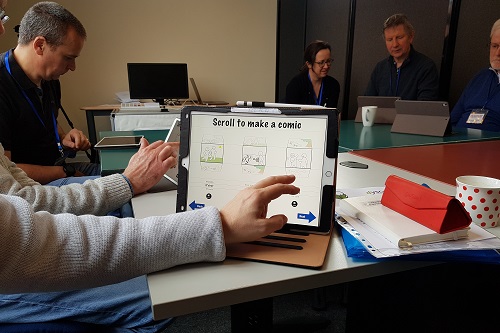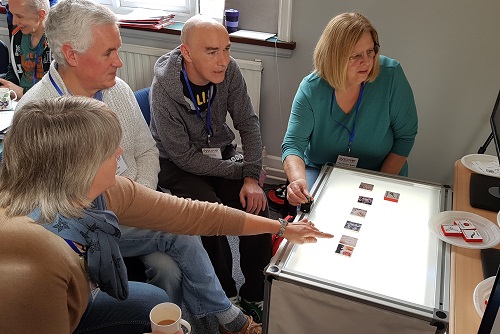The project has investigated, co-designed and trialled digital content creation and curation tools for people with aphasia.
By Mr John Stevenson (Senior Communications Officer), Published
Supported by the Engineering and Physical Sciences Research Council (EPSRC), the four-year INclusive digital Content for people with Aphasia (INCA) joint research project of the School of Mathematics, Computer Science and Engineering’s (SMCSE) Centre for Human-Computer Interaction Design, and the School of Health & Psychological Sciences (SHPS) has investigated, co-designed and trialled digital content creation and curation tools for people with aphasia from July 2017 to July 2021.
This multi-disciplinary project brought together human-computer interaction researchers, speech and language therapists, academia and charity working together. INCA was led by Principal Investigator, Professor Stephanie Wilson, in partnership with the Stroke Association and Dyscover.
On June 16th 2021, the research team celebrated the conclusion of the project with a virtual event featuring remarks and presentations from Professor Jane Marshall, SMCSE Dean, Professor Rajkumar Roy, Dr Madeline Cruice, Dr Abi Roper, Dr Timothy Neate (King’s College London), Gill Jackson and Rosemary Townsend (Dyscover).
Watch the video celebrating the INCA project’s conclusion event below:
Aphasia affects 350,000 people in the UK and affects people’s ability to speak, to understand speech, to read and to write. In severe cases, people may be able to speak only a few words or may have very limited ability to read and write.
Through the INCA project, the issue of the exclusion of people with language impairments, specifically acquired aphasia, from digital content creation and consumption is being addressed.
Participants at the INCA celebratory event using technologies developed during the project.
The overall objective is to investigate, co-design and trial digital content creation and curation tools for people with aphasia. Its specific sub-objectives have been as follows:
- To investigate and create innovative prototype digital technologies that empower people with aphasia to become content creators, curators and consumers;
- To evaluate the accessibility, acceptability and usability of the technologies through community projects where groups of people with aphasia work together over extended periods of time to create and curate digital content;
- To assess the impact of using the technologies on people’s sense of well-being, social inclusion and technology use;
- To deliver digital content from the community projects that give people with aphasia an online digital presence;
- To develop co-design techniques that support the participation of people with aphasia in design.
 Group activity using technology developed from the INCA project.
Group activity using technology developed from the INCA project.
Out of INCA came several innovative outputs uniquely created by people with aphasia and researchers such as CreaTable, MakeWrite, and ComicSpin.
To view links to project resources and information, please visit this weblink.
